Related Research Articles

Thomas Tallis was an English composer of High Renaissance music. His compositions are primarily vocal, and he occupies a primary place in anthologies of English choral music. Tallis is considered one of England's greatest composers, and is honoured for his original voice in English musicianship.
"I was glad" is a choral introit which is a popular piece in the musical repertoire of the Anglican church. It is traditionally sung in the Church of England as an anthem at the Coronation of the British monarch.

A metrical psalter is a kind of Bible translation: a book containing a verse translation of all or part of the Book of Psalms in vernacular poetry, meant to be sung as hymns in a church. Some metrical psalters include melodies or harmonisations. The composition of metrical psalters was a large enterprise of the Protestant Reformation, especially in its Calvinist manifestation.
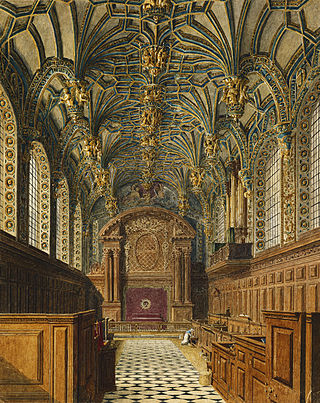
William Mundy was a Renaissance English composer of sacred music and father of composer John Mundy. Over four hundred years after his death, William Mundy's music is still performed and recorded.

Psalm 98 is the 98th psalm of the Book of Psalms, beginning in English in the King James Version: "O sing unto the Lord a new song; for he hath done marvellous things". The Book of Psalms starts the third section of the Hebrew Bible, and, as such, is a book of the Christian Old Testament. In Latin, it is known as Cantate Domino. In the slightly different numbering system in the Greek Septuagint version of the Bible, and in the Latin Vulgate, this psalm is Psalm 97. The psalm is a hymn psalm, one of the Royal Psalms, praising God as the King of His people. Like Psalms 33 and 96, it calls for the singing of "a new song".
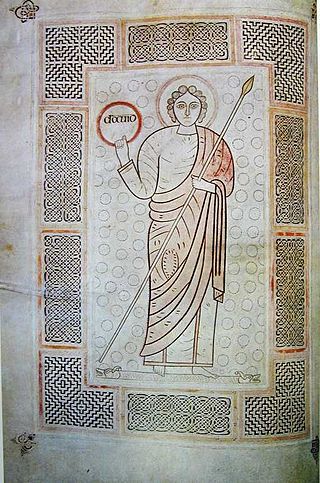
Psalm 100 is the 100th psalm in the Book of Psalms in the Hebrew Bible. In English, it is translated as "Make a joyful noise unto the Lord, all ye lands" in the King James Version (KJV), and as "O be joyful in the Lord, all ye lands" in the Book of Common Prayer (BCP). Its Hebrew name is מִזְמוֹר לְתוֹדָה, 'Mizmor l'Todah' and it is subtitled a "Psalm of gratitude confession". In the slightly different numbering system in the Greek Septuagint version of the Bible, and in the Latin Vulgate, this psalm is Psalm 99. In the Vulgate, it begins Jubilate Deo, or Jubilate, which also became the title of the BCP version.

Psalm 30 is the 30th psalm of the Book of Psalms, beginning in English in the King James Version: "I will extol thee, O LORD; for thou hast lifted me up". The Book of Psalms is part of the third section of the Hebrew Bible, and a book of the Christian Old Testament. In the slightly different numbering system used in the Greek Septuagint version of the Bible and in the Latin Vulgate, this psalm is Psalm 29. In Latin, it is known as "Exaltabo te Domine". It is a psalm of thanksgiving, traditionally ascribed to David upon the building of his own royal palace.

Psalm 93 is the 93rd psalm of the Book of Psalms, beginning in English in the King James Version: "The LORD reigneth, he is clothed with majesty". The Latin wording is Dominus regnavit, decorem indutus est. The Book of Psalms is part of the Hebrew Bible and the Christian Old Testament. In the slightly different numbering system of the Greek Septuagint and Latin Vulgate versions of the Bible, this psalm is Psalm 92. It is the first of a series of psalms which are called royal psalms as they praise God as King.
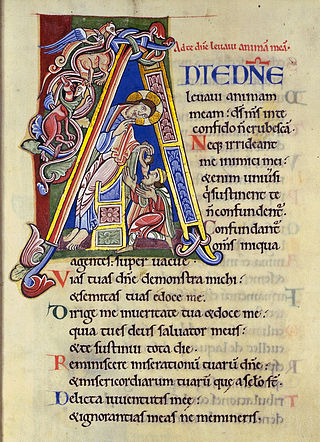
Psalm 25 is the 25th psalm of the Book of Psalms, beginning in English in the King James Version: "Unto thee, O LORD, do I lift up my soul.". The Book of Psalms is part of the third section of the Hebrew Bible, and a book of the Christian Old Testament. In the slightly different numbering system used in the Greek Septuagint and Latin Vulgate translations of the Bible, this psalm is Psalm 24. In Latin, it is known as "Ad te Domine levavi animam meam". The psalm, attributed to David, has the form of an acrostic Hebrew poem.

Psalm 29 is the 29th psalm of the Book of Psalms, beginning in English in the King James Version: "Give unto the LORD, O ye mighty, give unto the LORD glory and strength". The Book of Psalms is part of the third section of the Hebrew Bible, and a book of the Christian Old Testament. In the slightly different numbering system used in the Greek Septuagint and Latin Vulgate translations of the Bible, this psalm is Psalm 28. In Latin, it is known as "Adferte Domino filii Dei". The psalm is attributed to David. It is a hymn, describing the advent of Yahweh in a storm.

Psalm 136 is the 136th psalm of the Book of Psalms, beginning in English in the King James Version: "O give thanks unto the LORD; for he is good: for his mercy endureth for ever. ". The Book of Psalms is part of the third section of the Hebrew Bible, and a book of the Christian Old Testament. In the slightly different numbering system used in the Greek Septuagint and Latin Vulgate translations of the Bible, this psalm is Psalm 135. In Latin, it is known by the incipit, "Confitemini Domino quoniam bonus". It is sometimes referred to as "The Great Hallel". The Jerusalem Bible calls it a "Litany of Thanksgiving". It is notable for the refrain which forms the second half of each verse, translated as "For His mercy endures forever" in the New King James Version, or "for his steadfast love endures for ever" in the Revised Standard Version.

Psalm 122 is the 122nd psalm of the Book of Psalms, beginning in English in the King James Version: "I was glad" and in Latin entitled Laetatus sum. It is attributed to King David and one of the fifteen psalms described as A song of ascents. Its title, I was glad, is reflected in a number of choral introits by various composers.

Psalm 72 is the 72nd psalm of the Book of Psalms, beginning in English in the King James Version: "Give the king thy judgments, O God, and thy righteousness unto the king's son". In the slightly different numbering system used in the Greek Septuagint and Latin Vulgate translations of the Bible, this psalm is Psalm 71. In Latin, it is known as "Deus iudicium tuum regi da". Traditionally seen as being written by King Solomon, its heading may be translated 'to or for Solomon'.
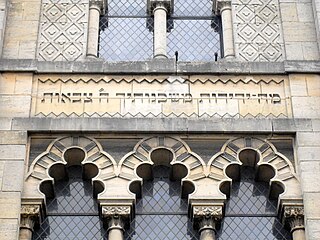
Psalm 84 is the 84th psalm of the Book of Psalms. The Book of Psalms forms part of the Ketuvim section of the Hebrew Bible and part of the Christian Old Testament. In the slightly different numbering system of the Greek Septuagint version of the bible, and in its Latin translations, the Vulgate, this psalm is Psalm 83. The psalm is a hymn psalm, more specifically a pilgrimage psalm, attributed to the sons of Korah.
Psalm 86 is the 86th psalm of the Book of Psalms. It is attributed to David. In the slightly different numbering system used in the Greek Septuagint and Latin Vulgate translations of the Bible, this psalm is Psalm 85.

Psalm 96 is the 96th psalm of the Book of Psalms, a hymn. The first verse of the psalm calls to praise in singing, in English in the King James Version: "O sing a new song unto the Lord". Similar to Psalm 98 and Psalm 149, the psalm calls to praise God in music and dance, because he has chosen his people and helped them to victory. It is one of the royal psalms praising God as the King of His people.
John Ness Beck was a composer and arranger of choral music. He was best known for his very popular and accessible settings of traditional Sacred music. Beck was a conductor and arranger of international renown. His works are highly celebrated and performed by high school, college, church, community, and professional choirs across the globe today.

Chandos Jubilate, HWV246, is a common name for a choral composition by George Frideric Handel. It was published as the first of the Chandos Anthems, and is known also as Chandos Anthem No. 1 and as Jubilate in D Major. A setting of Psalm 100, "O, be joyful in the Lord", it is the first in a series of church anthems that Handel composed between 1717 and 1718, when he was composer in residence to James Brydges, later 1st Duke of Chandos. The anthem was probably first performed at St. Lawrence's church, Whitchurch, near Brydges' country house. The work is written for a small ensemble of instrumentalists, solo singers and choir, and is approximately twenty minutes in length.

Osbert Parsley was an English Renaissance composer and chorister. Few details of his life are known, but he evidently married in 1558, and lived for a period in the parish of St Saviour's Church, Norwich. A boy chorister at Norwich Cathedral, Parsley worked there throughout his musical career. He was first mentioned as a lay clerk, was appointed a "singing man" in c. 1534, and was probably the cathedral's unofficial organist for half a century. His career spanned the reigns of Henry VIII and all three of his children. After the Reformation of 1534, the lives of English church musicians changed according to the official policy of each monarch.
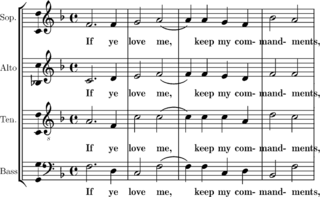
"If ye love me" is a four-part motet or anthem by the English composer Thomas Tallis, a setting of a passage from the Gospel of John. First published in 1565 during the reign of Elizabeth I, it is an example of Tudor music and is part of the repertoire of Anglican church music. An early English-language motet, it is frequently performed today, and has been sung at special occasions including a papal visit and a royal wedding.
References
- ↑ Mr John Harley (28 December 2015). Thomas Tallis. Ashgate Publishing, Ltd. p. 64. ISBN 978-1-4724-2806-6.
- ↑ Blanche Gangwere (2004). Music History During the Renaissance Period, 1520-1550: A Documented Chronology. Greenwood Publishing Group. p. 358. ISBN 978-0-313-29248-4.
- ↑ Milsom, John (2007). "Caustun's Contrafacta". Journal of the Royal Musical Association. 132 (1): 1–31. JSTOR 30152957.
- ↑ Dr Timothy Duguid (28 July 2014). Metrical Psalmody in Print and Practice: English 'Singing Psalms' and Scottish 'Psalm Buiks', c. 1547-1640. Ashgate Publishing, Ltd. p. 62. ISBN 978-1-4094-6892-9.
- ↑ Evenden, Elizabeth (2008). Patents, Pictures and Patronage: John Day and the Tudor Book Trade. Ashgate Publishing. ISBN 9780754654803.